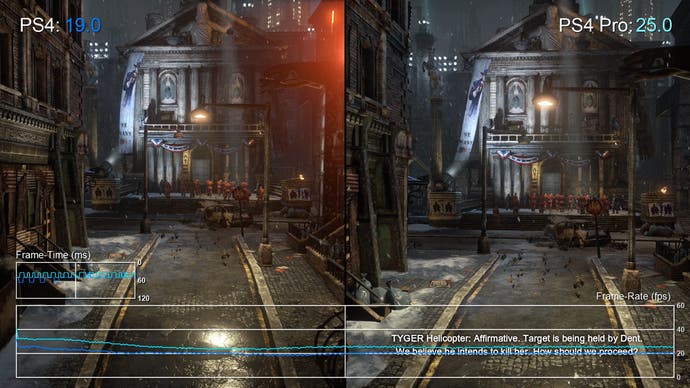Batman: Return to Arkham has stealth PS4 Pro support
And it shows us how standard PS4 games could run with access to full Pro power.
Yesterday we talked about Overwatch's PlayStation 4 Pro patch, which only adds superficial improvements. Today, it's the turn of Batman: Return to Arkham - a game that boosts performance but nothing else. It's as if developer Virtuos simply pulled a switch to enable PS4 Pro's additional CPU and GPU power on its base title with little regard as to what would actually happen. The results are predictably variable and rather poor overall, but it may well address unfinished business from our PlayStation 4 Pro review - just what would happen if users had the ability to enable the full resources of the new hardware on existing PS4 titles?
The vast majority of console games operate with a frame-rate limit of some description - typically 30fps or 60fps - meaning that the extra Pro power could simply be utilised to stabilise performance where base hardware can't meet the target. The tearing and frame-rate drops under 60fps in Project Cars could vanish, the mid-20fps drops occasionally seen in The Witcher 3 could improve significantly. It's not a massive upgrade, but for those of us who value stability in console performance, it's a big plus. Xbox One S has a minor GPU overclock that can help in this way - PS4 Pro has an uplift in both CPU and GPU terms that could do a whole lot more.
Batman: Return to Arkham actually has two titles that could help to isolate what the additional resources could achieve. Arkham Asylum operates with a wobbly 30fps cap, while Arkham City actually operates with an unlocked frame-rate that caps only at 60fps - a somewhat bizarre set-up, bearing in mind that the first Batman title is actually far less impactful on system resources. And let's be clear here, the Pro enhancements adopted by Virtuos appear to have required no real effort from the developer itself. Arkham City offers no resolution or effects upgrades. It just runs faster, but it's actually the variation in the boosts available that proves most fascinating.
First impressions are certainly favourable - Arkham City's prologue, featuring Catwoman's capture at the hands of Two-Face witnesses an immediate, dramatic improvement. Frame-rates in the low 40s on base hardware move up to 60fps, with just the odd dropped frame. The results are actually quite similar to that seen on the inFamous titles, Rise of the Tomb Raider and Knack, all which allow for unlocked performance with no visual upgrades - PS4 Pro may well have 2.3x the GPU power, but clearly there are system bottlenecks elsewhere. None of these games can sustain a locked 60fps.
Whether it's CPU power, storage IO limitations or memory bandwidth, it's clear that simply unlocking the Pro's GPU with an eye towards raw performance isn't the best use of the hardware, and Arkham City's breathtaking lack of optimisation actually proves valuable in isolating specific bottlenecks where the additional GPU power has no impact whatsoever. Consider the first fly-by cut-scene of Arkham City itself as the camera swoops through the street, halting just outside the courthouse where Catwoman is being held capture. Performance on base hardware bottoms out at a miserable 19fps. The Pro advantage? A mere six frames per second boost.
Something is holding the title back and the maths are illuminating - the Pro's 2.1GHz CPU clock-speed represents a 31 per cent increase in frequency, and this seems to account precisely for the frame-rate differential here between the same Arkham City scene rendering on base hardware and in Pro mode. But regardless, it is an improvement, and other areas that drop below 30fps on base hardware remain above that threshold on Pro.

And that's important - because if it were possible to deploy Pro speeds on unpatched PS4 games, maintaining 30fps and ironing out performance drops beneath would almost certainly be the number one use-case scenario, followed by a tighter lock on 60fps title where that's the performance target. Last, but not least, we should see dynamic resolutions stay closer to 1080p. Curiously, Batman Arkham City does use this too, but isolating areas where there are drops proved troublesome - our test clips all seem to operate at full 1080p, even when performance is crippled. If CPU is the primary limiting factor in many city scenes, as the evidence suggests, you have to wonder if dynamic scaling would help this title much at all.
But if better maintaining a capped 30fps would be the usual target for a 'Base+' mode on Pro, we wondered whether the other game in the Batman remasters pack - Arkham Asylum - might offer some insights there on the potential enhancements. Unfortunately, 30 minutes of play offered up a nigh-on identical experience between base and Pro hardware, which begs the question. Did Virtuos enable the Pro support flag on one title only? Bearing in mind the lack of any improvement elsewhere in the game, is the Pro support in Arkham City actually an accident, or maybe just some kind of Easter Egg?
Nothing escapes the fact that Return to Arkham is, to put it politely, 'sub-optimal' and our tests here highlight that simply turning on the taps and allowing PlayStation 4 Pro to power past its shortcomings simply doesn't work in the way it might on PC, where CPU power in particular is instrumental in brute-forcing engines originally designed for 30fps gameplay to hit twice the frame-rate. But with a view towards stabilising performance, we'd still like to see an 'at your own risk' mode where base titles can access Pro resources. And having twice established the precedent with Xbox One S and Xbox 360 backwards compatibility, the signs look good for a similar 'same but better' approach to running older software on Microsoft's forthcoming Project Scorpio.
If you're in the market for a PS4 Pro, take a look at our regularly-updated list of the best PS4 Black Friday deals.

